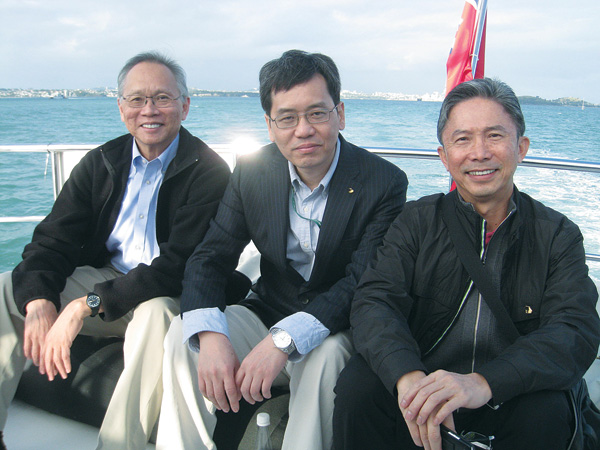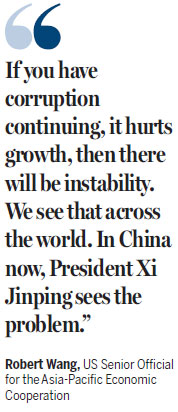Robert Wang: Public service matters
Updated: 2015-04-03 11:31
By Cai Chunying in Washington(China Daily USA)
|
||||||||
Wang's father, a diplomat serving the Kuomingdang regime in China before 1949 and later in Taiwan, supported Wang's intellectual pursuits, which was unusual among Chinese-American parents who often want their children to enter more practical fields like science or technology.
"I was fascinated about what I was studying and always wanted to learn more," recalled Wang who grew up in the small town of South Hadley, Massachusetts, while his mother attended graduate school and his father worked as an editor and publisher. Although the Wangs was the only Chinese family in town, Wang said he never had to struggle with a so-called identity crisis and was able to maintain a flexible and adaptable nature in school.
Wang continued to pursue his PhD in political science at the University of Iowa and secured a faculty position at Whittier College in California upon graduation, a seemingly stable and ideal path he designed for himself.
After seven years teaching international relations, Wang got a bit restless.
"I started to wonder if what I was teaching my students was actually correct or not," said Wang. "If you only have experience by reading other people's books and reports, then how do you know it's real, unless you actually go to the field and see what it is like?"
"Just like the Chinese saying, zhi shang tan bin," said Wang in his fluent Chinese, "that is 'talking about arts of war on paper'."
Wang decided to leave the "paper war" behind. He sat for the Foreign Service exam and was accepted in 1984, starting a journey that he describes as "extremely rewarding".
Among Wang's various Foreign Service postings, China is where he has spent most of his time. He first served at the US Consulate in Hong Kong in the late 1980s, analyzing and reporting on investment conditions in China for foreign businesses.
He then led the economic and political section at the US Consulate in Shanghai in the mid-1990s, and later became the head of the economic section at the US Embassy in Beijing in the early 2000s. In 2011, he returned to Beijing, serving as deputy to then US ambassador to China Jon Huntsman.
After Huntsman left to run for president and before the next ambassador Gary Locke came in, Wang was the de facto head of the embassy for about four months, experiencing the ups and downs of US-China relations.
Wang managed to travel to all of China's provinces (except Tibet) during his years in China, including his ancestral home in Fujian province, witnessing the sea change underway in the country where his parents grew up.
"I am optimistic about China, especially when looking at the young generation that has exposure to so much information and different ideas and is able to speak out and talk up," said Wang, adding that he loved to spend time visiting young people, NGO teams and minority groups during his field trips.
"Eventually they're going to transform China and transform the relationship China has with the rest of the world, including the US," he said.
Wang thinks the US and China still have a long way to go to build trust, because the two sides often speak with each other using different value systems.
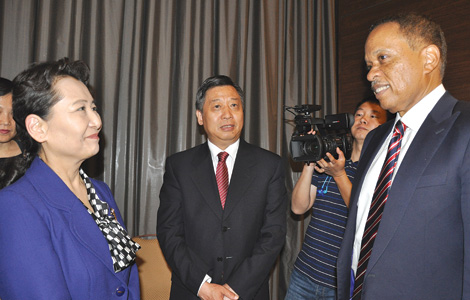
 Media players discuss bilateral role
Media players discuss bilateral role
 Beijing female pilots ready for takeoff
Beijing female pilots ready for takeoff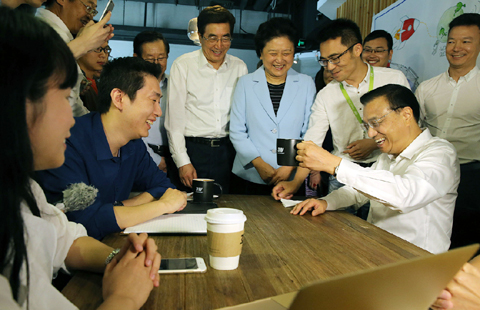
 Premier meets with group of innovators over coffee
Premier meets with group of innovators over coffee
 A glimpse of last rehearsal for V-Day parade
A glimpse of last rehearsal for V-Day parade
 Unusual but true: Breast milk ice cream just in time for royal baby
Unusual but true: Breast milk ice cream just in time for royal baby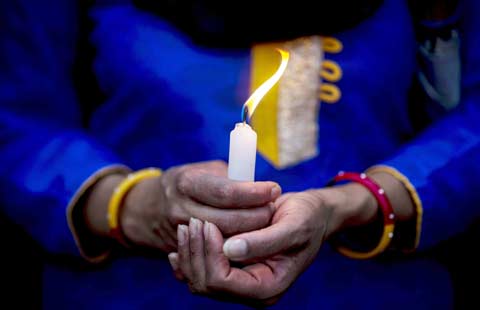
 Candlelight vigil held for victims in Nepal earthquake
Candlelight vigil held for victims in Nepal earthquake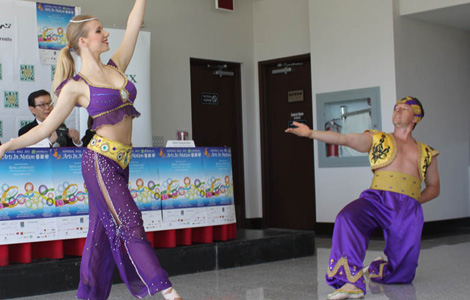
 Across Canada (May 8)
Across Canada (May 8)
 Ten photos you don't wanna miss - May 7
Ten photos you don't wanna miss - May 7
Most Viewed
Editor's Picks

|

|

|

|

|

|
Today's Top News
Media's role called crucial
Memory of Flying Tigers honored
Economic projects assist 'Belt and Road Initiative'
Chinese team helps heal Nepal
Joint anti-graft push needed, US delegates told
US NSA's phone spying program ruled illegal by appeals cour
US to launch federal probe into Baltimore police practices
AIIB 'backfired' on
US: Expert
US Weekly

|

|
